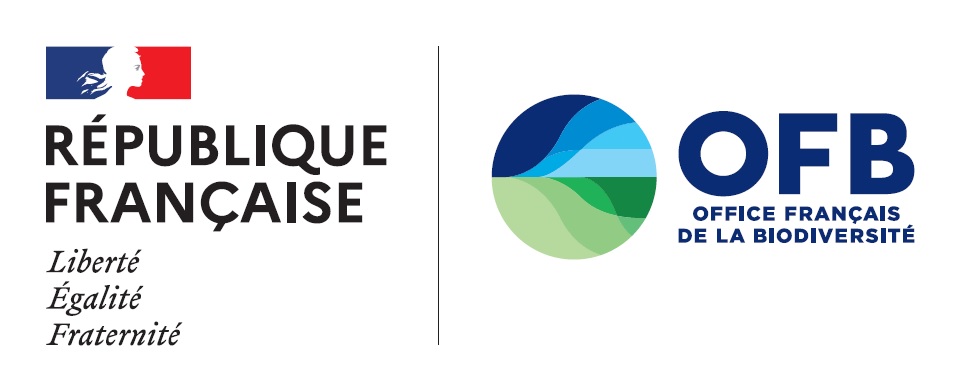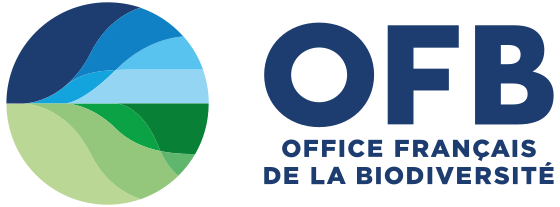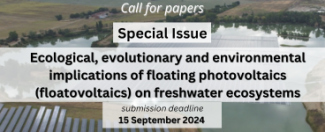[Call for papers]Special Issue on "Ecological, evolutionary and environmental implications of floating photovoltaics (floatovoltaics) on freshwater ecosystems"
Knowledge and Management of Aquatic Ecosystems (KMAE) serves as a foundation for scientific advice across the broad spectrum of management and conservation issues related to freshwater ecosystems. This special issue aims to address this knowledge gap by promoting studies that assess the ecological, evolutionary and environmental implications of floating photovoltaics and their implications.
Freshwater biodiversity and ecosystems are facing multiple human-induced pressures and, during the last decade, photovoltaic panels installed atop freshwater ecosystems (floatovoltaics), have emerged as a promising new technology to limit greenhouse gas emissions and decarbonize the energy sector. However, the rapid transition to low carbon energy solutions may induce unforeseen environmental impacts. While floating photovoltaics hold potential as a renewable energy solution, they might introduce new challenges to freshwater ecosystems. Alternatively, they may present a means of alleviating climate change-induced effects.
Our limited knowledge about the potential consequences (positive or negative) of this novel technology on freshwater ecosystems highlights the need for comprehensive research to ensure that the economic and energetic benefits of floating photovoltaics do not compromise, but ideally enhance, freshwater biodiversity, ecosystem functioning and associated ecosystem services.
This special issue aims to address this knowledge gap by promoting studies that assess the ecological, evolutionary and environmental implications of floating photovoltaics and their implications on:
- Freshwater biodiversity and ecosystem functioning
- Environmental parameters
- Evolutionary processes
- Ecosystem services
Given the novelty of this topic, we welcome all forms of contributions (field observation, experimentation, modelling, review, opinions). We also encourage submission of studies related to the mitigation of potential impacts and those that integrate environmental outcomes with other aspects of floating photovoltaic implications.
Guest Editors
- Julien Cucherousset - CNRS, France (julien.cucherousset@univ-tlse3.fr)
- Regina Nobre - University Toulouse III, France (regina-lucia.guimaraes-nobre@univ-tlse3.fr)
- Andrew Folkard - Lancaster University, United Kingdom (a.folkard@lancaster.ac.uk)
- Alona Armstrong - Lancaster University, United Kingdom (a.armstrong@lancaster.ac.uk)
Useful information
Important deadlines
- Manuscript proposal submission (500 words): 15 May 2024 – This short abstract should be sent directly to the Guest Editors
- Invitation for full manuscript submission: 01 June 2024
- Full manuscript submission deadline: 15 September 2024
- Anticipate publication: on a continuous-flow basis from end of 2024 to mid 2025
Submission instructions
- KMAE is an open access Journal with no fee payable by authors or readers.
- For further information on KMAE, please see kmae-journal.org
- Please read the Guide for Authors before submitting.
- Full manuscript submission should be made via the online editorial system.
Additional information: Please contact the Guest Editors julien.cucherousset@univ-tlse3.fr, regina-lucia.guimaraes-nobre@univ-tlse3.fr, a.folkard@lancaster.ac.uk, a.armstrong@lancaster.ac.uk
To discover
Journal Knowledge and Management of Aquatic Ecosystems (KMAE) | Knowledge and Management of Aquatic Ecosystems - KMAE |
KMAE serves as a foundation for scientific advice across the broad spectrum of management and conservation issues related to freshwater ecosystems. The journal publishes articles, short communications, reviews, comments and replies that contribute to a scientific understanding of freshwater ecosystems and the impact of human activities upon these systems.





